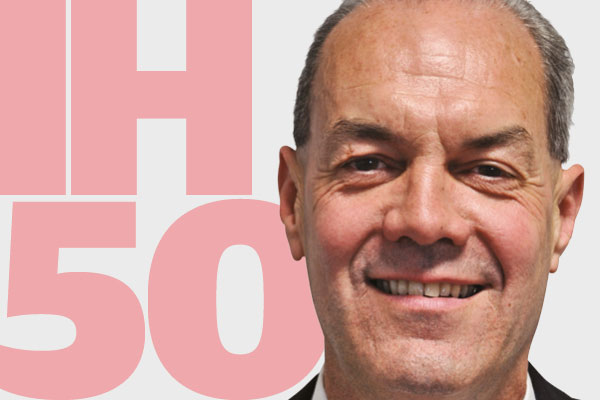You are viewing 1 of your 1 free articles
Meet the Housing Ombudsman: an interview with Richard Blakeway
Richard Blakeway talks to Nathaniel Barker about his plans to make waves while repairing broken relationships. Photography by Simon Brandon
“We’re quite casual here. I’m by far the most overdressed in the office,” remarks Richard Blakeway.
It is not clear if he perceives the irony here. The recently appointed head of the Housing Ombudsman Service and former deputy mayor of London under Boris Johnson has over the years earned himself a steadfast reputation for perpetual untidiness – rather like his old boss.
True, today he is wearing a shirt and tie, but his low-hanging trousers, rolled sleeves and tousled hair betray that little has changed.
His demeanour matches appearances. Affable and jocular, Mr Blakeway tends to express himself in casual language.
That is not to say he is not serious. With the microphone switched on, he is notably more businesslike and the jokes evaporate entirely. This side of Mr Blakeway matches his impressive CV more closely.
As well as having spent eight years at City Hall, he was also once chief advisor for housing at influential right-leaning thinktank Policy Exchange. Later, in 2016, he had a brief stint as a housing advisor to David Cameron, until the EU referendum drove the prime minister from office.
Following some time in the private sector, he has now emerged at the Housing Ombudsman – itself a role that has had a choppy few years.
A key piece of the jigsaw for dealing with tenant complaints, it fell into the spotlight alongside the Regulator of Social Housing (RSH) as the fallout from the Grenfell Tower fire led to questions about why residents’ complaints have not been heard. Criticism of some of its limitations followed, which led to a promise to reform it – amid wider empowerment of residents – in 2018’s Social Housing Green Paper.
It will be Mr Blakeway who steers it through this period of reform, a process he began in September, replacing interim appointment Andrea Keenoy. Inside Housing asks why he wanted the job. The answer, as always, is contemplative.
“So I think there are a number of reasons. One is that I’m obviously familiar with the sector, I know the sector, but I’m not of the sector, I would say, so I think I can bring insight and knowledge from having worked with the sector but while still being independent of it in the roles that I’ve done.”
He adds: “I am hugely interested in the role that ombudsmen can play to promote system change, and I think that’s an interesting direction that many ombudsmen are looking at going in, and I feel there’s a huge role for this organisation to do something similar.”
Interestingly, he also draws a parallel between the ombudsman’s work and trying to improve services for rough sleepers while at the Greater London Authority (GLA) – a task he was “hugely motivated by”. Mr Johnson had made an election commitment to end rough sleeping by 2012, which clearly was not fulfilled. After a fair bit of prodding – Mr Blakeway has not lost the key politician’s skill of handling tough questions by answering a slightly different one – he admits that while proud of initiatives to help entrenched rough sleepers, “the flow to the street was far beyond the powers of the GLA”.
As for whether he expects Mr Johnson’s government now to meet its target to end rough sleeping by 2025, he is keen to drop the subject: “That’s beyond my humble role as the Housing Ombudsman.”
For those wondering, when Inside Housing asks if Mr Blakeway has spoken to his former boss since he entered Number 10, the answer is no.
One does not get the sense that Mr Blakeway has spent much of the past six months pressing ministers for urgency over promises made in the Social Housing Green Paper – such as a residents’ awareness campaign about the ombudsman or scrapping the much-maligned “democratic filter”, which means most complaints must wait eight weeks before reaching the service.
“That’s not really our role,” he says, shrugging, when asked if there is a government policy he would change.
Conversation turns to the more comfortable ground of his ambitions as Housing Ombudsman. Mr Blakeway joins the service at a moment of change, with a radical overhaul of the scheme awaiting ministers’ approval. Proposed measures include a new “severe maladministration” determination category where multiple failures have been found and a new power requiring landlords to maintain a set complaints procedure.
While he agrees that “you can characterise it as being tougher”, it is notable that Mr Blakeway does not claim this term himself.
Mr Blakeway says his organisation’s mission will be to “redress an imbalance in power” and promote changes to the system
Central to his vision for a reinvigorated Housing Ombudsman Service is the idea of sharing lessons. It is a point to which he returns frequently. “The sector is structured in such a way that the lessons you can take from the casework we handle have a real chance of being applied,” he observes.
This project has already tentatively started, with the first in a new series of regular Insight Reports published last month. In time, he is keen to establish a dedicated team for this purpose.
Preliminary work is also under way to develop a complaint-handling code in partnership with landlords and tenants that will seek to promote “positive complaints culture” across the sector, including in relation to governance.
To the same end, the ombudsman will soon begin making far more information publicly available. Currently, it rarely names landlords that have been found at fault, but that is set to change. Mr Blakeway says that “by this time next year” he anticipates the service will be publishing details of all determinations, including the landlord and what order or recommendation was made in the case – such as a compensation payment or system change – as well as “landlord reports” that will enable comparisons between similar organisations.
This new level of transparency will be “a real step change”, Mr Blakeway claims. He hopes it will stop people being dissuaded from complaining because “they’re not sure it will make a difference” and that it helps to identify the issues that commonly become problematic.
“The sector is structured in such a way that the lessons you can take from the casework we handle have a real chance of being applied”
A key challenge for Mr Blakeway is reducing the ombudsman’s sluggish resolution times. It has a long-standing target to determine cases within six months on average. Good progress has been made, with the average case time slashed from eight months at the beginning of 2018/19 to 6.7 months by the end, and Mr Blakeway says the service is currently meeting the goal. However, the service wants to go further, aspiring to slash times to just three months within two years.
Achieving that ambition will require landlords’ co-operation. The clock starts ticking from the point a complaint is made – but the ombudsman cannot work on the case in earnest until all parties have provided evidence.
Mr Blakeway says landlords’ performance at meeting the deadline is “deeply variable”, although that is arguably a charitable description. A recent trial in November found that 91% of responses to the ombudsman’s requests for evidence arrived late, with the figure 88% for December. In one case, it took 75 days for evidence to be submitted. For tenants, warns Mr Blakeway, that “really undermines the trust in the system”.
Part of the problem, he admits, likely lies with the ombudsman, which he posits could be clearer about what evidence it requires. However, he adds that “culture and behaviour” also play a role – with the resolutions team able to predict whether certain landlords will submit information late based on past experience. Interestingly, Mr Blakeway says that landlords have often been surprised when he has raised this issue with them.
Under its new scheme – if approved by ministers – the ombudsman will impose a deadline of 15 working days and declare “complaint handling failures” for landlords routinely missing it; this information is also likely to be published.
It certainly sounds like a tougher Housing Ombudsman and that prospect may make some landlords a little nervous. However, Mr Blakeway does not give the impression that he intends to play hardball with the
sector and he is noticeably careful about being too critical.
“My very strong view is that social housing… has an incredibly strong role to play in our housing system and an ombudsman has an important role to play in creating a healthy housing system. That’s why I very much feel that, as I said, the lessons you can draw from the casework show we do have a real potential to create wider change,” is as far as he will go.
Instead, he is far quicker to reflect challenges onto the ombudsman itself. The service’s caseload is bulging, with complaints rising an average of 17% a year over the past five years, the proportion in which maladministration or partial maladministration has been identified increasing from 24% to 38% in that time.
Rather than highlight these figures as a concern for the sector, he suggests that the ombudsman should do more “to really think about how the lessons from what we find are applied” and “get in under the skin” of the issues to understand why, for instance, repairs consistently constitute around a third of complaints.
This approach may have something to do with Mr Blakeway’s firm conviction that a crucial part of the Housing Ombudsman’s role is to be “restorative” for the landlord-tenant relationship – particularly as after a case is closed the complainant will almost always continue living in the same home. He is keen to step up the service’s mediation work, arguing that simple conference calls have in the past “repaired a relationship as well as repaired a repair”.
“My very strong view is that social housing has an incredibly strong role to play in our housing system”
It might also have roots in past experience. While appearing before the Housing, Communities and Local Government Select Committee last summer as part of the recruitment process, Mr Blakeway was grilled over colourful comments he made about social housing in 2009 when he was deputy mayor - he had told a conference: “The quality of life is a joke. Forty-six per cent of social tenants love their dog more than their neighbour. Why? Largely because of the total absence of the market.”
Now, he deftly deflects questions about the episode by talking about gathering feedback.
Some might view the proposed new ombudsman scheme as taking a more prominent role in consumer regulation, especially the publication of landlord reports. However, Mr Blakeway appears eager to downplay the suggestion. While he agrees that the new scheme “will change” the relationship between the RSH and the ombudsman, he asserts that his own organisation’s mission of “redressing an imbalance of power” is very different to the “hard lines” within which the regulator operates.
The ombudsman may refer complaints suggesting potential systemic issues at an organisation to the RSH, but whether it does so proactively enough is questionable.
For instance, the ombudsman’s recently published first Insight Report cites a case study in which severe maladministration was identified at an unnamed housing association that had cut off, without proper consultation, support services for 29 older residents living in supported accommodation. This may look like an open and shut case of a “potentially systemic” issue but Mr Blakeway says it was not referred to the RSH.
Despite the bold promises for change, Mr Blakeway is apparently reluctant to ruffle feathers. Whether that will be possible as the ombudsman enters its next chapter remains to be seen.
While Inside Housing is preparing to leave, his unpolished bonhomie returns and he asks us to find space for the following quote: “By the way, one thing I meant to say was how brilliant everyone is here.” Happy to, Mr Blakeway.
What the Social Housing Green Paper says about consumer regulation
“We wish to consider a number of possible regulatory changes to enable consumer standards to be enforced in a similar way to the economic standards.
“This would enable the regulator to take a more rigorous and proactive approach to enforcement, like other regulators such as Ofsted.
“We want to ensure the ‘serious detriment’ bar does not prevent the regulator from taking a more proactive approach, and if it does, then we will consider removing it.
At the same time, we are clear that the regulator should continue to focus on cases of persistent and/or serious failure by landlords, leaving individual complaints to be addressed through the landlord’s own complaints process and the Housing Ombudsman.
“Residents should be aware of all routes open to them to raise concerns and feel confident using them. In 2017/18, 91 per cent of customers said that the Housing Ombudsman treated them well and 75 per cent said that the ombudsman helped resolve their cases.
“However, a number of residents told us that they had not been aware of the Housing Ombudsman’s services.
“Within the social sector we have heard suggestions that more could be done proactively to raise awareness of residents’ options for escalation, for example supplying details on redress options at every new letting. We are looking at awareness of housing dispute resolution services more widely as part of our consultation on strengthening consumer redress in housing.
“We also want to consider if there is a case for an awareness campaign to support social residents to understand their rights to seek redress and to know how to make complaints and escalate them where necessary.”















